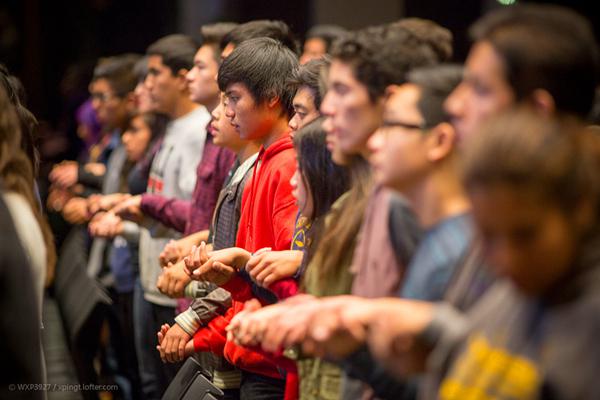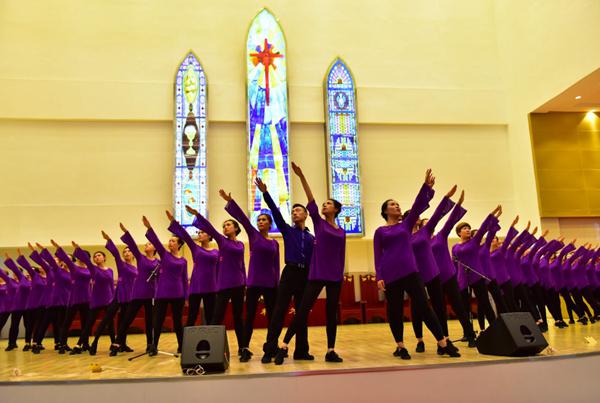In her early twenties, Sister Z looks like a typical sunny girl with tresses, but in her girlhood, she was labeled the most as "rebellious", "gang" and "bad student".
Born in China's south-central Hunan Province, Z's devout grandmother took her to attend services every Sunday in a church where the majority of the congregation was middle-aged and elderly. However, the service was detestable to her because she should have spent half the day playing with her friends. After she went to high school, she told a lie that the school forced her to join in a tutoring program on Sundays, who actually intended to escape the church to have fun.
In 2016, an article titled "A Post-1990s Christian Tells Why Young People Don't Want to Go to Church" went viral among the Chinese Christian community. The author shared five reasons why post-90s people were unwilling to attend church: a lack of understanding the church where was considered as a place of restraint rather than freedom; feeling serious and boring there; failing to feel God's love in the church; the poor level of pastors; monotonous church activities.
A report on the "Evolution of the Post '90s in China" published by Mondelez International, Tencent, Carat, and Amplifi in November 2016 said that post '90s generation (the Chinese equivalent of Generation Y) aged 16-24 focused on "making friends, having fun, study and work." As a result, the globally curious post-'90s at their core were open-minded and sought to enjoy their life between responsibilities.
Most parents of the young generation were born after 1965, who have experienced the changes after the reform and opening up in China. Through their hard work, they have created material wealth for their children, but spend little time with them and miss their growing up. Raised on touchscreens and online games, the children are obsessed with the digital world where they play games, make friends, buy things, and everything else.
Sister Wang who was a millennial shouted, "The post '90s is a guiltless generation who has been hurt and swallowed by the material. Superficially living with much material wealth, they lack the root of life - love; ostensibly pouring scorn on emotions, we have a strong desire for love and cherish it infinitely; ostensibly without pursuit of the future and idleness, there lies a great power inside - 'Give me a fulcrum and a place to stand and I will move the world.' "
211 Million Chinese post-90s made up 15.4% of the total population, according to National Bureau of Statistics in 2015. There is also "a cliff-like drop" in the church's post-90s generation number, in comparison with previous generations.
Then how should the church tackle the difficult ministry challenge?
Preacher Chen from Henan stated that since the generation was becoming mature who had no conception of authority, one of the best ways could be to establish a fellowship whose leader had better be born from 1985 to 1991.
Post-90s preacher Xiao Bin joined a campus fellowship in college and after graduation, became the fellowship's leader. Having pastored college students for seven years, Bin said that there was no all-purpose gathering pattern for this kind of fellowship and all was under exploration.
Unlike traditional churches whose main activities were singing hymns, praying, and giving sermons, he gave an example of Fellowship B: at first, it attracted young people with rich activities like praise and worship music meetings, games, outings, and picnics. It turned to be an activity-driven fellowship and made the workers extremely exhausted. Then it changed its direction - concentrating on Bible studies. Another training meeting was added - great and eloquent speakers were invited to give "lectures". Over time, the speakers were replaced by new ones, resulting in failing teaching quality, thus this meeting became as dull as ditch water.
A preacher suggested that the fellowship should develop into a church, so it imitated the traditional church and the activities were mainly around hymn singing, sermons, and prayers. Unfortunately, the transformation led to the low participation of the students in the fellowship that failed to give them a real existence. Ultimately, it has turned into a comprehensive style - holding church activities, lectures, and other programs freely organized by students themselves.
Bin added that they couldn't stay in an ultra-conservative fellowship that had a closed system with a lack of tolerance. Millennials didn't care whether the church was a three-self one or a house church, regardless of its denomination, instead, they made a judgment by reasoning. He expected every of his fellowship members to be a Christian who could talk with society and be a spokesman of Christ in the world.
Secondly, Preacher Chen said that pastors needed to balance the needs of people of all ranks in the pulpit. Although this placed high demands on preachers, the most important thing was to give practical sermons rather than cry out empty and spiritual words.
Five post-90s Christians talked about sermon styles they liked in an interview with Christian Times, an online Chinese Christian newspaper. One thing their answers had in common was that they liked practical, well-organized, logic and coherent sermons. Brother Liang, a second-generation Christian born after 1990, said, "This kind of sermon shows me what I should do in my real life, but some pastors' preaching is like brainwashing you or instilling religious chicken soup. Although it may taste sweet when you have it the first time, you will feel bored and poisoned with it after drinking too much."
Another good way was to conduct worship and praise meetings specifically for the youth and help university students engage in social service where they could apply their faith into practice.
However, Sister Xia from Suzhou opposed the point. In the West's eyes, a person came of age at 20, while a Chinese had to wait until 30. Young Christians could have an easy start - learning to communicate and share with others. Then an experienced leader should encourage young members to have more communications, sum up and analyze their problems through the communications, and give targeted counseling to them.
She suggested that a young Christian in his early twenties could be led by a man at around 30 rather than by a student or a new graduate because the young generation cared much about job hunting and gaining their foothold in society.
Rev. Wang put forward that a good approach was to carry out continuing interpersonal care through personal visitation, counseling, and group activities. Young people would be different when they knew God's love through people who really cared about and understood them. The church could organize outdoor and indoor events for young people via fellowships or groups to achieve the effects of enhancing their friendships and showing the church's vigor to young laypersons.
Mary Sun, a co-worker from Haikou Haixiu Church of Hainan that has three young fellowships, said that the church could cultivate young people who could bear the church's mission. For example, young believers are often engaged in the ministries of Haixiu Church like the worship and praise, publications, financial management, Sunday school and ushering. The church also held camps for Chinese and foreign young Christians who received training programs including pre-marital preparation, marriage counseling, and how to live a victorious life.
In the third year of life in high school, Sister Z became extremely notorious, who was a "bad student" in the minds of teachers and "bully" in the eyes of her classmates.
One day when she was in class, she used a penknife to scratch a leg of a male student during the tussle with him. As a result, his leg was bleeding so he was sent to the hospital immediately. She totally freaked out and was dragged by her grandma along the way to the church where she heard someone reading the Bible. She recalled her past years during which she only had fun with a bad friend but neglected her studies and her grandma told her to attend church services, read the Bible, and pray with her and that God would help her break from the past.
Since then, she came to the church with her grandma and received baptism after sitting gaokao, China's college entrance exam. She has been involved in church ministries until now.












